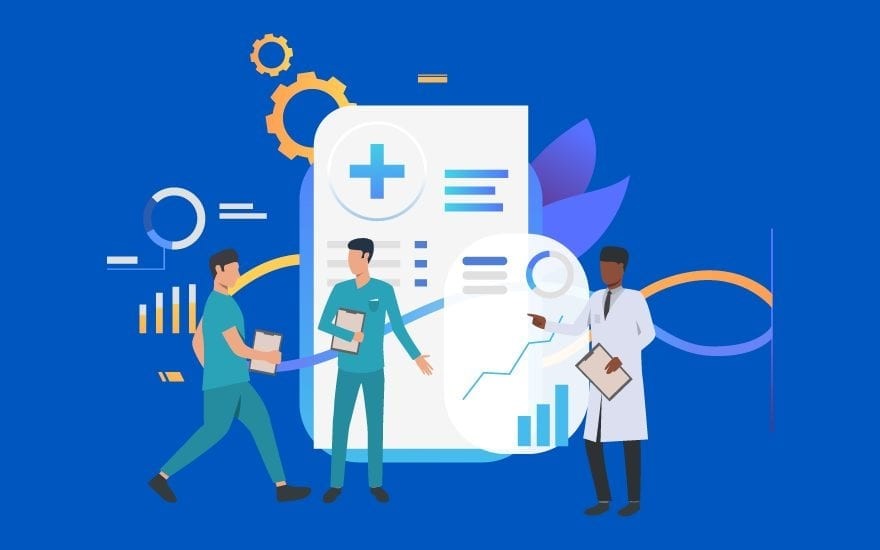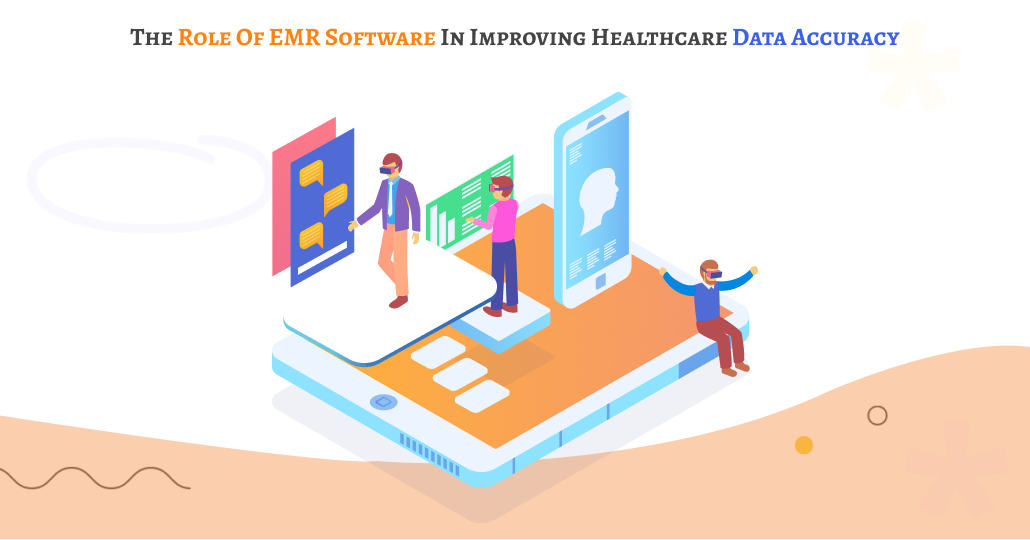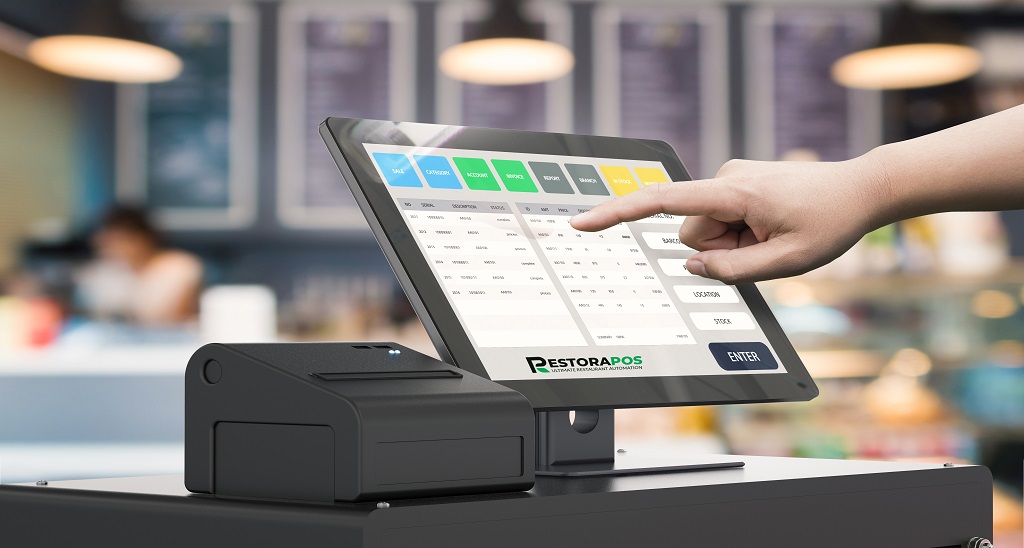EMR software (electronic medical record software) has become an integral part of enhancing patient care in the dynamic healthcare environment. Because EMR systems can digitalize patient information, EMRs are not only improving the effectiveness of clinicians but also becoming a critical factor in guaranteeing the correctness of medical information. Entering into EMR software solutions, we go to discover how EMR systems are changing the face of healthcare at least through an increase in the accuracy of data management.

Contents
- 1 The Evolution of Healthcare Data Management
- 2 The Impact of EMR Systems on Data Accuracy
- 3 How EMR Software Reduces Human Error
- 4 The Power of EMR Software Companies for Improving Healthcare Accuracy.
- 5 The Benefits of Real-Time Data Access
- 6 Enhancing Communication and Collaboration Across Healthcare Providers
- 7 The Future of EMR Software and Data Accuracy
- 8 Conclusion
The Evolution of Healthcare Data Management
Traditionally, hospitals used paper-based records to record patients’ details. Nevertheless, this approach was plagued by difficulties including data loss, errors and inefficiency. Introduction of EMR (Electronic Medical Record) software changed the whole practice and introduced a digital evolution, which allowed physicians to better organize and store patient data.
Using EMR software, hospitals and clinics can now access real-time patient data accurately and promptly to be updated. EMR systems are designed to centralize all patient information in one platform, reducing the risk of errors that may occur when handling paper documents. In addition, these systems guarantee that patient data is understandable, minimizing the risk of errors in handwritten notes or prescriptions.
The Impact of EMR Systems on Data Accuracy
Accuracy improvement of medical data is one of the main objectives of EMR software. Traditional methods of maintaining patient records often led to discrepancies due to manual entry errors, loss of documents, or illegible handwriting. Thanks to the migration from paper-based medicine to EMRs, healthcare professionals have significantly improved the situation of obtaining accurate and current patient information.
Using EMR software, healthcare professionals can collect data in real-time and have it stored in a standard, consistent format. Not only does this prevent errors due to illegible writing or missing papers, but it also facilitates the archiving of a patient’s medical history. In addition, EMR-based software typically comes with built-in validation functionality, for example in the form of drop-down lists and automatic validations, which will help omit some of the most common data entry errors, and therefore maintain the quality of the data inputted into these systems.
How EMR Software Reduces Human Error
Human mistake is one of the most important reasons for inaccurate data in health care. EMR systems solve this problem the automatic of most of the steps which were before dependent on the human intelligence. As one instance, the employment of EMR software to keep track of patient histories, evaluations, medication, and treatment therapy does not leave the chance of losing or misreading a handwritten note.
Furthermore, seamless exchange of data happens with the combination of EMR systems and other health care technologies (e.g., laboratory systems, radiology machines). This allows medical professionals to retrieve up-to-date patient data without manual updates, thereby lessening the probability of errors that occur with outdated or missing data.
The Power of EMR Software Companies for Improving Healthcare Accuracy.
The rise of EMR software companies has been a driving force behind the widespread adoption of EMR Software Solution in healthcare. These companies are continually innovating and creating increasingly complex systems that tackle new and evolving problems in healthcare data management. The advances by EMR software vendors brought up the creation of extremely specialized EMR systems, which can be designed to fit the unique requirements of hospitals, clinics, and private practices.
As EMR software companies enhance their products, they introduce new features aimed at improving data accuracy, such as machine learning algorithms that can detect patterns and flag inconsistencies. These bilities are intended to be able to recognise potential errors prior to they can have an effect in patient care, providing a further level of protection for healthcare professionals.
The Benefits of Real-Time Data Access
A major reason for the popularity of best emr software is its capacity to provide in realtime access to patient information. At a hospital level, real-time information concerning a patient given and shown in the appropriate and on-time format is one of life and death. EMR software products guarantee that clinical professionals have access to the necessary information in the moment when decisions need to be taken swiftly and properly.
For instance, in a hospital EMR database, a physician may easily review a patient’s medical records, laboratory test results, schedule and/or obtain a prescribed drug regimen, with detailed dosing information. This minimizes the risk of medical error, like the prescription of adverse drug drug interactions or the omission of a crucial patient piece of information for decisions of treatment.
Enhancing Communication and Collaboration Across Healthcare Providers
Communication among healthcare providers is a major determinant in the improvement of data accuracy. EMR systems promote teamwork by allowing easy communication of patient data among various departments and medical professionals. Regardless of whether the patient is provided for transfer between departments or sees a specialty referral physician, EMR software provides access to the same updated, real-time data to all providers.
A single platform for patient data EHR software solutions minimises the chance for error that can occur when a healthcare provider is dealing with patients with differing recorded medical histories from different providers. Not only does this enhanced communication lead to improved data quality in healthcare, but it also leads to improved patient outcomes.
The Future of EMR Software and Data Accuracy
Moving forward, the impact of EMR software to reach a high level of data completeness will still expand. With advancements in artificial intelligence and machine learning, EMR software solutions will become even more intelligent, capable of predicting potential errors before they occur. These developments will improve the reproducibility of patient records and the quality of the whole process in the healthcare sector.
It may be that in the future EMR software will also be increasingly interoperable so that data can be exchanged between health care systems, either within or outside the health care network. This will provide a more complete and true picture of a patient’s condition, whatever the type of care they seek for it.
Conclusion
In conclusion, EMR Software plays a critical role in improving the accuracy of healthcare data. By automating data entry, reducing human error, and facilitating better communication among healthcare providers, EMR systems ensure that patient information is accurate, up-to-date, and accessible. As EMR software companies continue to innovate and develop new solutions, the future of healthcare data accuracy looks brighter than ever.
For healthcare providers looking to enhance their data management practices, investing in the best EMR system hospital available is a step toward a more accurate, efficient, and patient-centered approach to care. With EMR software leading the way, the healthcare industry is poised to deliver better outcomes through more reliable and precise data management.




